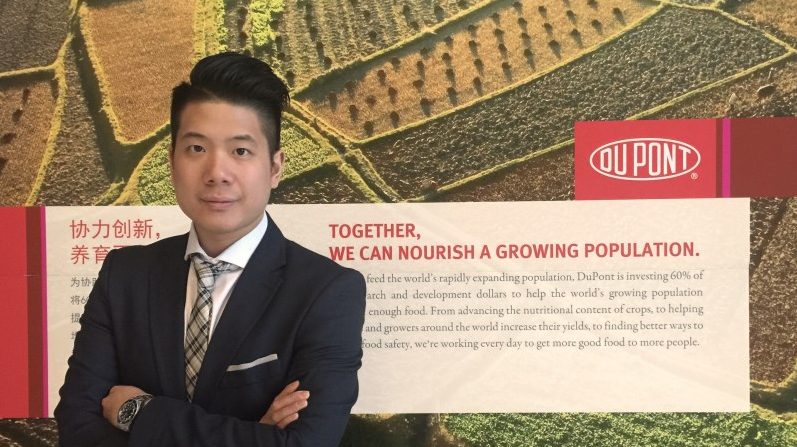Career
• 4 minute read
Spotlight on Alan Siu: Embrace Change and Seize the Opportunity

Alan Siu, an alumnus of CUHK Business School’s MBA program, is the Asia Pacific Regional Marketing Manager with E. I. du Pont de Nemours and Company, an American multinational chemical corporation headquartered in Wilmington. Prior to joining DuPont, Siu’s work experience spanned from biological industry in Canada to luxury goods industry in Germany. A Hong Kong-born Canadian, Siu returned to Hong Kong in 2009 and pursued his MBA degree here, which eventually led to a successful career in mainland China. He talks to CBK@CUHK about his MBA experience and how the program has helped him land on an exciting career in mainland China, as well as the opportunities the country has offered to young people in Hong Kong.
By Fang Ying, Senior Writer, China Business Knowledge @ CUHK
Q: What motived you to pursue an MBA degree at CUHK?
A: As a management professional for a few companies of various scales, I am aware that to rely solely on accumulation of working experience is no longer enough to advance my career path. In order to create more value for the company and my career life, I need to equip myself with a structured business education as well as a strong network in the region I wish to grow in.
The MBA program in CUHK Business School has a very deep and broad relationship across Asian countries with a strong support team that is very professional and capable. What’s more important, comparing with other universities in Hong Kong, CUHK Business School is famous for its education on general management and consulting specialty. I am confident that the offerings of CUHK Business School perfectly match my development direction. This is the reason why I chose to pursue an MBA at CUHK.
Q: What’s the biggest influence that MBA program has brought to you, both in terms of career path and personal life?
A: The CUHK MBA program does its best in terms of diversity. You can meet all kinds of people from different backgrounds. Diversity is actually the essence of general management and what I really wanted to experience and learn from. Furthermore, you can also enjoy the flexibility that the program has offered. You are not limited to the standard options. Program concentration is tailor-made to your needs.
Q: Please tell us more about your work with DuPont China?
A: During my first year in DuPont, I was a marketing leader of the Market Leader Development Program. This was actually a very aggressive management development program for young MBA graduates. I was responsible for commercial and residential marketing for some specific products in construction market at that time. Later, I was promoted to the Accelerated Leader Development Program, which aims at nurturing potential directors for the company. I became the Marketing and Technical Leader responsible for developing business strategy, marketing plan, and profit and channel management for certain products. In addition to the business functions, I also had the chance to be involved in product technology and R&D. It’s a very special role in a science company as I act as a bridge between customers and the technical team to create market driven solutions. In a sense, our customers get to “choose” what product they wish to have to capture the demand in the market.
With a proven track record in developing a strong team, driving business programs and capturing new business opportunities, I was promoted to be the AP Regional Marketing Manager overseeing Asia Pacific market including Japan, Korea, ASEAN, HK, and Taiwan. The new challenge focuses in driving significant changes in both business model and product development to accelerate business growth with results that exceed the expectation of key stakeholders or investors.
Q: Do you see any challenges living and working in Shanghai and how do you deal with them?
A: As an Asian with Chinese background, I thought it would be fine for me to live and work in Shanghai. But after I arrived here, I encountered a great amount of culture shock. For example, the way mainland Chinese think, their characteristics based on where they were born and raised, the way they work and do business on a drinking table are all different from what I have experienced before. To overcome these problems, I spend a lot of time with my Chinese colleagues and local people observing how they behave.
As we know, building up ‘guanxi’ with people is important in China, so in terms of networking, I have joined several business associations, including the CUHK alumni association.
Q: What do you see as the biggest business opportunity for young people in China in the next 5 years?
A:I see a huge business opportunity in the Internet of Things (IoT) and the industrial revolution. IoT is still a relatively new concept in the market. With the destructive change in the value chain, a lot of companies still don’t know how to approach their customers and meet their needs in this area. Furthermore, with the manufacturing power oversupply in China, there is a strong need to redistribute the excess to the right markets. The mega trend will remain in China for at least 5 to 10 years. Now is the best time for young people to capture this billion-dollar opportunity.

